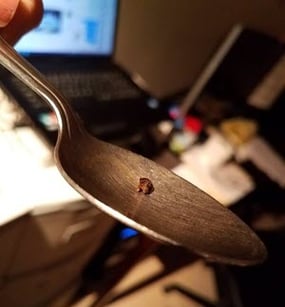
A member of our marketing team had a kidney stone, which she passed at home, in April 2018. (She likes to joke that she was doing fieldwork on our behalf. She named the stone "Ralph"—pictured to the right.)
So in honor of National Kidney Month and Ralph's upcoming birthday, we're sharing a quick and easy way for readers to test their kidney stone knowledge—knowledge that could help you avoid having one of these pesky buggers.
Disclaimer: As with all content on our blog, this isn't intended to be medical advice, but rather educational information.
Always consult your healthcare provider if you think you have a kidney stone or you have specific questions.
Need a doctor? Our urologists would be happy to help.
1. True or false: While they can be extremely painful, kidney stones are extremely rare.
FALSE. Over half a million people visit the ER each year with kidney stones, and 1 in 10 people can expect to experience kidney stones in their lifetime. And once you've had one, you're at greater risk for developing another one.
2. True or false: There are different "types" of kidney stones, and the most common is calcium oxalate.
TRUE: Other types include uric acid, struvite, and cystine (which is the rarest kind and tends to run in families). If you pass a kidney stone at home and you're able to retrieve it, you should bring it to your health care provider so they can have it tested. Then, you'll know what type it is, which is helpful info to have.
3. True or false: You can't reduce your risk for developing kidney stones.
FALSE: One of the most important things people can do is drink plenty of water. Hydration is a kidney stone's kryptonite. But diet can also play an important role, meaning the right diet could lower your chance of developing stones in the first place and reduce your risk of developing more stones if you've already had one.
The type of diet to follow depends on the type of stone you're prone to forming. But some overall dietary changes can help. For example, reducing the amount of protein and salt in your diet are good first steps (and good steps for a healthful diet in general).
It's worth noting that many people think they need to avoid calcium if they have calcium oxalate stones (the most prevalent type), but the opposite is true. Calcium oxalate stones result from too little calcium and too much oxalate.
If you have too little calcium in your diet (or a medical condition that wreaks havoc with calcium levels, such as hyperparathyroidism), then you'll end up absorbing more oxalate in your body, which will be delivered to the kidneys where it could form stones. So a calcium-rich diet reduces that risk because calcium binds with oxalate in the stomach and intestines before it reaches the kidneys
As for oxalate, here's the scoop: While reducing oxalate-rich foods would likely help reduce the risk for stone formation, the problem is oxalates are in so many foods—and many of them are good for you, such as spinach and beets.
A better solution? If you're at risk for forming calcium oxalate stones, try eating foods high in oxalate and high in calcium at the same time because this can help reduce the risk that you might otherwise experience if you ate the high-oxalate food alone. (Because the calcium will bind with the oxalate before it reaches the kidneys.)
So, for example, you'll often find nuts and berries listed on the "avoid" list if you're at risk for developing oxalate stones since those foods are high in oxalates. But if you mix the nuts and berries with yogurt, which is rich in calcium, then the calcium will bind with the oxalate in the stomach and intestines before reaching the kidneys.
4. True or false: Some kidney stones require surgery.
TRUE: If the stones are small enough (typically smaller than .5 mm), you can usually pass the stone on your own. Bigger stones could require surgery. Non-surgical treatments, such as shockwave lithotripsy, can help break up the stone for easier passing.
Below, Dr. Padraic McCahill from our North Easton Care Center discusses lithotripsy in more detail:
5. True or false: Gastric bypass surgery can put you at greater risk for developing calcium oxalate kidney stones.
TRUE. After gastric bypass, how your body absorbs calcium will change. The Kidney Foundation explains, "Following gastric bypass surgery, your body absorbs less calcium from your digestive system. Because of this, higher levels of oxalate are found in the urinary tract. The build-up of oxalate can form crystals, which can form kidney stones."
Other risk factors include irritable bowel syndrome (IBS), obesity, high-sodium diets, high-protein diets, dehydration, and certain medical conditions.
Need a urologist to help you manage kidney stone issues? If you're in the greater Boston area, make an appointment with one of our fine physicians.

